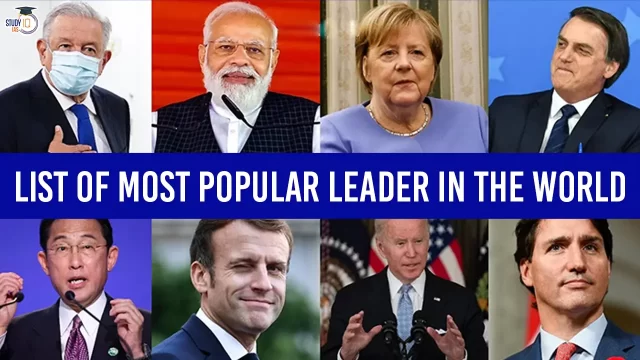In the year 2024, significant influence on global politics was exerted by a select group of leaders whose decisions and actions shaped the geopolitical landscape. An analysis of these influential political leaders will be conducted to highlight the critical roles they played in both national and international spheres. This analysis will cover their contributions to policy-making, international diplomacy, economic strategies, and their impact on global issues.
1. Joe Biden – President of the United States
Under the leadership of President Joe Biden, the United States maintained its position as a pivotal force in global politics. A strong emphasis on climate change policies was placed, with significant steps taken towards renewable energy investments and international climate agreements. The Inflation Reduction Act, signed into law, was instrumental in addressing economic challenges, and initiatives to strengthen the middle class were prioritized. Efforts to restore alliances with NATO and re-engage in multilateral organizations were observed, reflecting a shift from isolationist policies. His administration’s handling of the Russia-Ukraine conflict through economic sanctions and military aid was noted as a critical element in international diplomacy.
2. Xi Jinping – President of China
President Xi Jinping continued to solidify his influence both domestically and globally. The Belt and Road Initiative (BRI) was expanded, furthering China’s economic and strategic reach across Asia, Africa, and Europe. A firm stance on Taiwan was maintained, with increased military presence in the South China Sea highlighting China’s assertiveness in regional disputes. Efforts to strengthen China’s technological and economic independence were evident through policies promoting domestic innovation and reducing reliance on foreign technologies. The Chinese economy’s resilience during global economic downturns was attributed to Xi’s strategic economic management.
3. Vladimir Putin – President of Russia
Vladimir Putin’s presidency was marked by significant geopolitical maneuvers, particularly regarding the conflict in Ukraine. Continued support for separatist regions and military interventions underscored Russia’s aggressive foreign policy. Economic sanctions imposed by Western countries were countered through alliances with non-Western nations, showcasing Putin’s ability to navigate complex international dynamics. Domestically, efforts to maintain political control and suppress dissent were intensified, reflecting a consolidation of power. The energy sector, particularly natural gas exports, was used as a tool to exert influence over European countries.
4. Narendra Modi – Prime Minister of India
Prime Minister Narendra Modi’s leadership was characterized by a strong emphasis on economic reforms and infrastructure development. The ‘Make in India’ initiative was expanded to boost manufacturing and attract foreign investments. India’s position in global geopolitics was strengthened through strategic partnerships with the United States, Japan, and Australia, particularly in the context of the Quad alliance. Domestic policies focused on digitalization and improving the ease of doing business were implemented, contributing to India’s economic growth. Modi’s role in mediating regional conflicts in South Asia was also significant.
5. Angela Merkel – Chancellor of Germany
Although Angela Merkel’s term as Chancellor ended in late 2021, her influence continued to be felt in 2024. Germany’s economic stability and leadership within the European Union were attributed to Merkel’s policies. Her approach to the European migrant crisis and efforts to maintain the integrity of the EU amidst rising populism were notable. The transition to renewable energy, initiated under her leadership, continued to guide Germany’s environmental policies. Merkel’s diplomatic skills were instrumental in navigating the complexities of EU politics and maintaining cohesion among member states.
6. Emmanuel Macron – President of France
President Emmanuel Macron’s tenure was marked by efforts to reform the French economy and strengthen the European Union. Labor market reforms and initiatives to promote innovation and technology were prioritized. Macron’s vision of a more integrated and sovereign Europe was pursued through advocacy for a European defense force and stronger EU governance. His handling of the Yellow Vest protests demonstrated a balancing act between implementing necessary reforms and addressing public discontent. France’s role in international diplomacy, particularly in the context of African relations and counter-terrorism efforts, was enhanced under Macron’s leadership.
7. Jair Bolsonaro – President of Brazil
President Jair Bolsonaro’s administration was noted for its controversial policies and divisive rhetoric. Environmental policies, particularly concerning the Amazon rainforest, drew international criticism. Efforts to bolster the Brazilian economy through deregulation and privatization were undertaken, though met with mixed results. Bolsonaro’s handling of the COVID-19 pandemic and his approach to public health were contentious issues. On the international stage, a shift towards stronger ties with the United States and a skeptical stance towards China were observed.
8. Boris Johnson – Prime Minister of the United Kingdom
Prime Minister Boris Johnson’s leadership was defined by the post-Brexit era challenges and opportunities. Efforts to establish the UK as a global trading nation were prioritized through new trade agreements. The response to the COVID-19 pandemic, including the successful vaccination campaign, was a key focus of Johnson’s administration. Economic policies aimed at leveling up disadvantaged regions and fostering innovation were implemented. The UK’s role in international diplomacy, particularly concerning NATO and the G7, was strengthened under Johnson’s leadership.
9. Jacinda Ardern – Prime Minister of New Zealand
Prime Minister Jacinda Ardern’s leadership continued to gain global admiration for her empathetic and effective governance. New Zealand’s response to the COVID-19 pandemic, characterized by strict measures and transparent communication, was widely praised. Ardern’s commitment to social justice, climate change, and mental health initiatives were key aspects of her domestic policies. On the international stage, New Zealand’s role in advocating for human rights and multilateralism was enhanced under her leadership.
Conclusion
The influence of these political leaders in 2024 was marked by their ability to navigate complex domestic and international challenges. Their leadership styles, policy decisions, and strategic alliances significantly impacted global politics. Through a combination of economic strategies, diplomatic efforts, and domestic reforms, these leaders shaped the geopolitical landscape and addressed critical global issues. Their legacies will likely continue to influence political dynamics for years to come.










